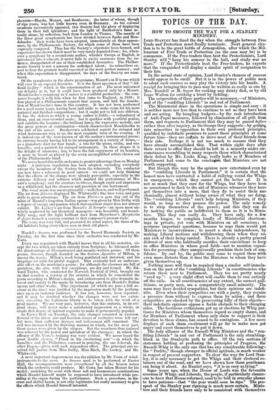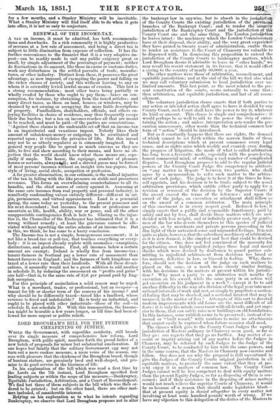TOPICS OF THE DAY.
HOW TO SMOOTH THE WAY FOR A STANLEY MINISTRY. Lain STANLEY has fixed the day when the struggle between Free Trade and Protection must finally terminate. Next general elec- tion is to be the great battle of Armageddon, after which the Mil- lennium of Free Trade or Protection (as the case may be) is to commence. If the Free-traders then beat the Protectionists, Lord Stanley will *" hang his armour in the hall, and study war no
more. If the Protectionists beat the Free-traders, he expects that the vanquished will display a similar spirit of resignation to their fate.
In the actual state of opinion, Lord Stanley's chances of success would appear to be small. But it is in the power of public men to adopt such courses as may play the victory into his hands. A receipt for bringing this to pass may be written as easily as one by Mrs. Rundell or M. Soyer for cooking any dainty dish, or by old Isaac Walton for catching a trout by tickling.
The cooperation of three parties will be necessary,—of Ministers, and of the " confiding Liberals" in and out of Parliament.
The Ministerial share in the operations is simple and easy : it is neither more nor less than to continue to act as they have been and are acting. By bungling budgets—by the rash introduction of Anti-Papal measures, followed by elimination of all pith from them, and requests to Parliament that they may be passed before rather than after inquiry, as Sir Geozve Grey suggests—by. getter into minorities in opposition to their own professed principles, qualified by indefinite promises to assert those principles at some future time—they are certain to drive most of their friends from their side. Perhaps it is not too much to assume that they have already accomplished this. That within eight days after their return to office they should be left in a minority under cir- cumstances resembling in many respects those which characterized their defeat by Mr. Locke King, really looks as if Members of Parliament had come to the conclusion that Ministers are not: worth supporting.
But though this may be the opinion now entertained even by the " confiding Liberals in Parliament," it is certain that the honest men have contracted a habit of rallying round the Whigs in emergencies, which they cannot get the better of. It is not so much that they care for the Whigs, but they have been so accustomed to flock to the aid of Ministers whenever they have got themselves into a mess, that they fly to assist them me- chanically, almost without being aware of what they are doing.. The "confiding Liberals" can't help helping Ministers, if they would, so long as they possess the power. The only remedy is to strip themselves of the power; and this they can da by making the public as indifferent to them as it is to Minis- ters. This they can easily do. They have only, for a few months longer, to complain loudly of Ministerial shortcom- ings in private, yet vote with Ministers on all occasions ; to postpone important questions, because to urge them would put Ministers to inconvenience ; to assert a sham independence, by making Liberal motions and withdrawing them when they see any risk of their being carried. There is already a.pretty general distrust of men who habitually sacrifice their convictions to keep in office Ministers in whose good faith—not to mention capaci- ties for governing—they unequivocally proclaim their lack of con- fidence. By and by, the public may come to regard them with even more distaste than it does the Ministers to whom they have given themselves up.
Nothing more will then be required than a similar self-immola- tion on the part of the " confiding Liberals" in constituencies who
these men to Parliament. They too are pretty nearly " used up ": a very slight effort will enable them to run entirely off the rails. In all constituencies of any extent, the earnest poli- ticians, or party men, are a comparatively small minority. The mass may have decided sympathies, but their opinions are indefi- nite. Even when their sympathies are with a party, they require a pressure from without to express them by action ; and these sympathies are checked by the persevering folly of their objects— their indefinite opinions oppose a feeble obstacle to their changing sides. The factitious enthusiasm got up at elections by Whig par- tisans for Ministers whom themselves regard as empty shams, and for Members of Parliament whose only claim to support is their devotion to these shams, has ceased to be contagious. A few more displays of such sham excitement will go fax to make men get angry and exert themselves to put it down. The holy alliance of the Russell-Whig Ministers and the " eon- fiding Liberals" in and out of Parliament is the only stumbling- block in the Stanleyite path to office. Of the two sections of statesmen holding or professing the principles of Progress, the Russell-Whig is the only one that has any considerable following : the " Peelite," though stronger in official aptitude, is much weaker in respect of present supporters. To clear the way for Lord Stan- ley, it is only necessary to get the Whigs and their electoral re- tainers out of the road, and we have shown how these gentlemen can bring it about. As Hamlet says, " it is as easy as lying."
Scan& years ago, when the House of Lords was the favourite aversion of Whigs and Liberals, the people, if particularly clamor- ous to have that House reformed, used to he told in oracular phrase to have patience—that " the pear would soon be ripe." The pro- spect of the Stanley pear ripening is much more certain. Minis- ters and their friends have only to be consistent with themselves for a few months, and a Stanley. Ministry will be inevitable. What a Stanley Ministry will find itself able to do when it gets into office, it is not so easy to conjecture.



























 Previous page
Previous page